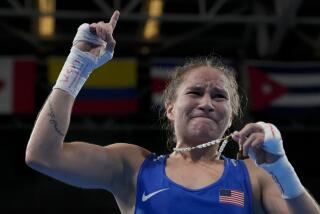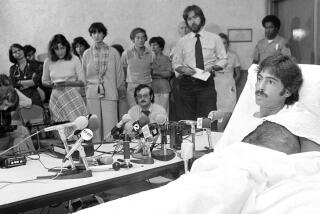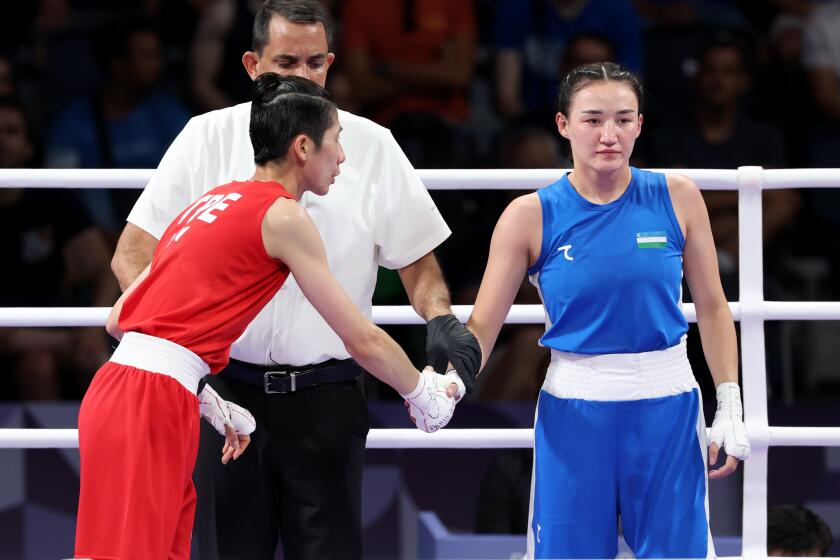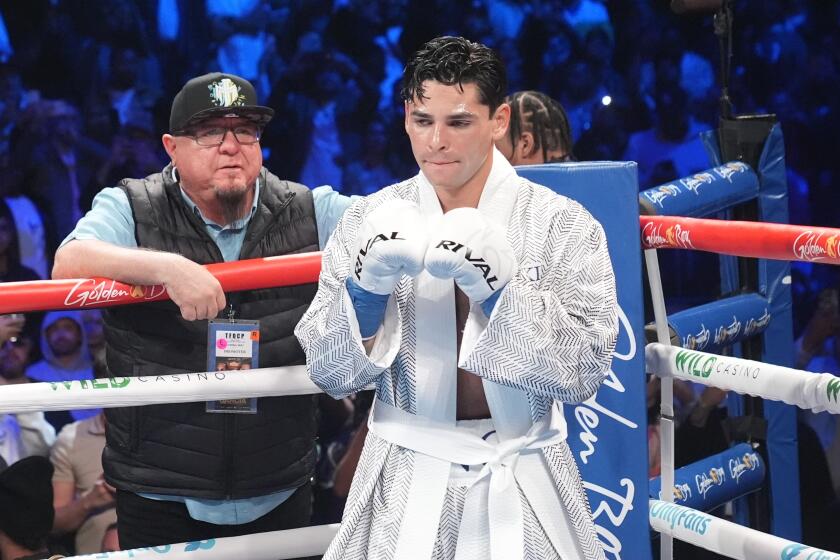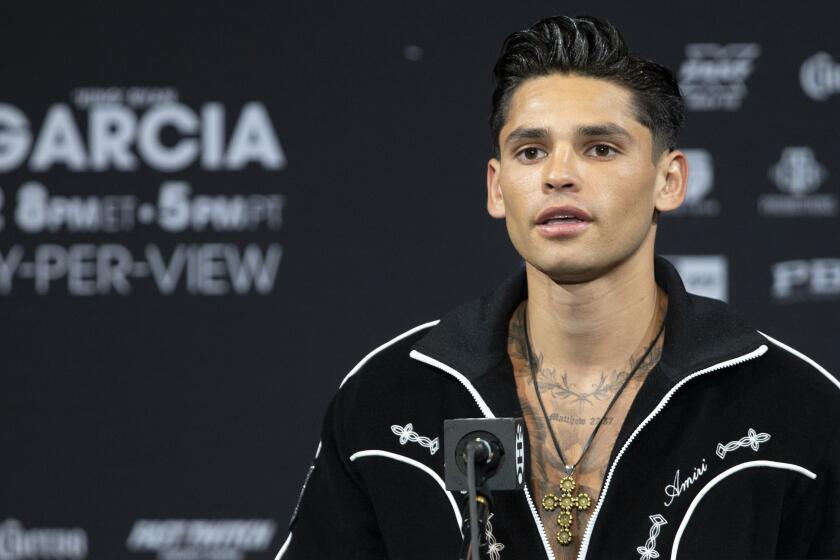The book on Ray Mancini, bruising chapters and all
We are a month away from the 30th anniversary of an ugly moment in an oft-ugly sport. Let’s hark back.
There once was a tough kid from a tough town. His name was Ray Mancini and his town was Youngstown, Ohio. Ray, like his town, settled many issues with his fists. His nickname, perfect for his chosen profession of boxing, was “Boom Boom.” But he hadn’t really chosen his profession, nor his nickname. His father was a fighter whose nickname had also been Boom Boom, and with the advent of his son’s career, became just Boom.
The original Boom Boom, Lenny Mancini, was a very good fighter, but World War II intervened and left him with enough damage from a German mortar shell to negate future championship hopes. The new Boom Boom, a decent and caring person, vowed to win the title of which his father had been deprived.
That he did May 8, 1982, taking the World Boxing Assn. lightweight belt in Las Vegas over Arturo Frias. Referee Richard Green stopped the fight with six seconds left in the first round after Mancini, at one point, had landed 36 unanswered blows.
Soon, on Nov. 13, 1982, Mancini was in the new outdoor ring at Caesars Palace, defending his title.
His opponent was Duk-Koo Kim, an unheralded Korean who had probably gotten the title shot through the usual slimy politics of boxing’s deal-making promoters and sanctioning bodies. Just days before, the glamour boy of the sport, Sugar Ray Leonard, had announced his retirement because of an eye injury. That made Mancini the next glamour boy.
What was supposed to be a mismatch was a brutal brawl. Kim hadn’t been much of a fighter, certainly not one with international stature, until he fell in love with Young Mee Lee. Then he had a purpose, and he took that into the ring that night against one of the toughest boxers ever.
Before the fight, Kim told reporters, “If he doesn’t die, then I will come back dead.”
In the 13th round, Mancini hit Kim with 44 unanswered shots, then 17 more later. Kim, who had battled valiantly, didn’t throw a punch until 1 minute 19 seconds had elapsed in the round. In the 14th, Mancini connected with a straight right so powerful that Kim collapsed, his head coming to rest on the bottom rope. Gamely, he tried to get up, but Green, the same referee as in the Frias fight, stopped it.
In all the ensuing celebration, Mancini didn’t notice Kim immobile in his corner, soon carried off. Kim would never regain consciousness and boxing had yet another time of self-examination and handwringing over what has been obvious since the days of bare-knuckle fights — boxing is a brutal, uncivilized, unnecessary sport that appeals to our basest instincts and will always exist.
The Mancini story is now told masterfully in a book titled “The Good Son.” It is written by Mark Kriegel, veteran sportswriter and currently a commentator on the NFL Network. Both Kriegel, a self-professed “pushy New Yorker,” and Mancini, the favorite son of Youngstown, live in Santa Monica. They had dinner a few years ago at a restaurant there named Il Forno Trattoria, and a bond developed.
“We started at 6:30,” Kriegel says, “and were still going when they were closing down. It was the first time I felt like I was home here.”
Joining them, in a scene that repeats itself often to this day, was actor Ed O’Neill, who escaped Youngstown to land starring roles in “Married ... With Children” and now “Modern Family.”
Kriegel was under contract to write a book about Michael Jordan, but somehow sold the idea of a Mancini book instead to the publisher. He went to Mancini for permission. Same restaurant, probably same table.
“I told him we can’t pay you, you’ll have no say in the manuscript, and I promise it’s going to hurt you,” Kriegel says. “Ray looked at me and said, ‘OK.’”
The book is about the Kim tragedy, and much more. Mancini’s brother died of a gunshot wound, apparently accidentally discharged by his exotic dancer girlfriend. His father eventually died, exhibiting signs of dementia in his last years. Kim’s mother committed suicide. So did the referee, Green, who, to most ringside observers, handled the fight correctly. Mancini has three children, but is now divorced.
Thursday in Youngstown, in what Kriegel called “an industrial-strength size” bookstore, Mancini sat for a book signing. An estimated 500 people came. Kriegel announced that, because of the crowd, Mancini might just sign his name, not personal messages. Then Mancini, now 51, stood up and said he’d sign as long as everybody stayed.
The book signing started at 7:30 p.m. and ended at 2:30 a.m.
On June 23, 2011, at a long table at Il Forno, with Ray Mancini sitting at the head — “like Michael Corleone,” says Kriegel — Kim’s widow, Young Mee, and son, Jiwan, as well as Kriegel, O’Neill and Mancini’s children, had dinner.
Eventually, Jiwan, born seven months after his father’s death, stood up and said to Mancini, “Now I can tell you, when I first saw the fight, I hated you.”
Young Mee wept and it was somehow like family.
“It was the closure,” Kriegel says.
More to Read
Go beyond the scoreboard
Get the latest on L.A.'s teams in the daily Sports Report newsletter.
You may occasionally receive promotional content from the Los Angeles Times.

